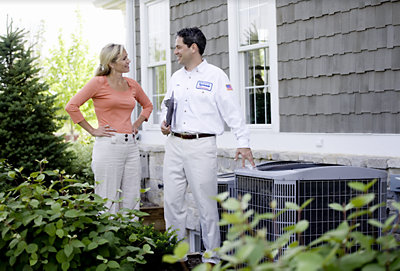
Air filters on HVAC units should be changed every one to three months, depending on your filter type. If you have pets or indoor allergies, you should change your air filter more often. Clogged air filters can limit airflow, causing your furnace to work harder, which results in more repairs and less heating efficiency. Changing your air filter ensures that your furnace can suck in enough air to properly filter the air in your home and provide adequate heating and airflow to all the rooms in your house.
Check your thermostat’s settings and change the batteries. You’ll want to make sure that the temperature settings and times are correct: The Department of Energy recommends setting your thermostat to 68 degrees while you are awake or at home, and 61 degrees while you are at work or sleeping.
Just because your furnace was operating properly at the end of last season, doesn’t mean it’s fine for the upcoming season. These inspections also include thoroughly cleaning the inside and outside of your furnace, lubricating any moving parts and testing your furnace for proper operation. A professional inspection with our HVAC technicians can help find problems with your furnace and thermostat before the winter season starts. If any problems are found with your unit, they can be repaired in a timely manner. Here’s a list of our 19-step precision tune-up:
Furnaces are designed to last between 20 and 30 years, but a newer model may be more energy-efficient than those manufactured even 10 years ago. If you’ve noticed the need to perform more repairs on your unit or have noticed a dramatic increase in your winter heating bills, replacing your unit prior to the start of the new winter season can help you save money on your heating bills and ensure you have reliable heat all season long.
To schedule a furnace inspection in Atlanta, call us at 770-421-8400.
If you're using natural gas to heat your home or business, check out this helpful blog from our partner Gas South, Georgia's most-trusted natural gas provider: Tips to Reduce Your Natural Gas Bill
Get up-to-date current news, promotions and industry tips.